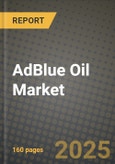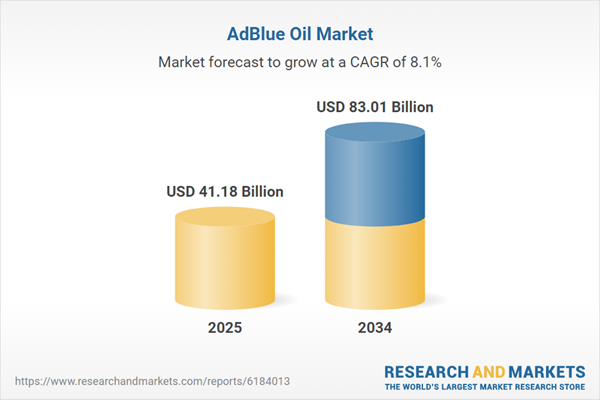AdBlue Oil Market
The AdBlue/DEF market is fundamentally regulation-driven. Every time on-road or off-road diesel standards tighten (Euro VI/VI-e, Bharat Stage VI, China VI, U.S. EPA 2010+ and Tier 4 Final, emerging Latin rules), vehicle OEMs and fleets adopt SCR, which in turn creates recurring demand for spec-compliant AdBlue/DEF. The product itself is commoditized - ISO 22241 / DIN 70070 / AUS 32-grade, low in metals and contaminants, non-hazardous, and sensitive to storage temps - but the market is not: value is created in secure urea sourcing, deionized water quality, blending/packaging hygiene, and reliable distribution to where trucks, buses, construction/mining equipment, ag tractors, and gensets actually refuel. As HD fleets grow and governments enforce onboard diagnostics and NOₓ checks, consumption rises roughly in line with diesel mileage and SCR penetration. Growth pockets include: OEM fill and dealer networks for new vehicles; highway and hub dispensing (IBCs, tote tanks, forecourt pumps); packaged SKUs (1-20 L) for vans, LCVs, and passenger diesels; and captive/industrial users (ports, mines) that install bulk tanks. Challenges are feedstock/urea price volatility, winter-grade needs in cold regions, adulteration and fake product (which damages SCR catalysts and voids warranties), and temporary demand shocks when freight slows. As fleets electrify, the medium-term demand story shifts toward HD, long-haul, construction, and ag segments that will stay diesel-SCR for years; suppliers that bundle telematics tank monitoring, bulk delivery, and quality certification can protect margins even in a price-sensitive market.AdBlue Oil Market Key Insights
- Regulation demand. Every SCR-equipped diesel needs AdBlue/DEF; more SCR vehicles on the road or in the field directly increases volume.
- Quality is non-negotiable. Off-spec fluid (too much biuret, metals, or tap-water ions) can crystallize, clog dosing systems, and poison catalysts fleet operators prefer certified brands.
- Distribution is the moat. Proximity filling stations, truck-stop pumps, depot tanks, and reliable IBC/tote deliveries matter more than minor price differences.
- Packaging segmentation. Small packs for LCVs/passenger diesels, drums/IBCs for fleets, and bulk for large depots let producers serve all channels without overextending logistics.
- Urea price swings hit margins. When fertilizer/urea markets tighten, DEF producers must either pass through costs or sacrifice margin integrated or contracted urea supply helps.
- Counterfeit/adulterated product is a live issue. In emerging markets, mixing urea with non-DI water or even using urea fertilizer harms SCR OEM-linked suppliers gain trust.
- Cold-climate handling. DEF freezes around -11°C; insulated tanks, heated hoses, and winter logistics (plus vehicle-side thawing) are purchase/operations considerations.
- Telematics and fluid monitoring. Fleet platforms that alert on low AdBlue levels, abnormal consumption, or tampering help enforce compliance and avoid derate modes.
- Non-road is a growth wedge. Construction, mining, ag, material-handling, and stationary engines using SCR add steady, depot-based demand that’s easier to serve than long-haul.
- Electrification is gradual. Even as city buses or LCVs go electric, long-haul and heavy, high-load-duty diesels will keep SCR and AdBlue relevant in the medium term.
AdBlue Oil Market Reginal Analysis
North America
EPA rules and SCR on Class 8 trucks make DEF standard; highway truck-stop pumps and branded jugs dominate. Fleets want bulk and telematics-linked deliveries, with strong emphasis on ISO 22241 quality and winter usability.Europe
Euro VI and widespread diesel HD fleets ensure mature, highly competitive AdBlue supply through fuel stations, dealers, and distributors. Counterfeit control, packaging recyclability, and adherence to VDA/ISO specs are procurement gates.Asia-Pacific
China VI, Bharat Stage VI, and expanding HD/freight corridors are the main demand engines. Rapid market growth creates room for both high-quality OEM-linked brands and lower-priced local fills - quality enforcement will decide winners.Middle East & Africa
Growth follows import of Euro VI / advanced SCR vehicles, heavy construction, and oil & gas fleets. Hot climates increase storage/evaporation concerns; many buyers want bulk at depots rather than roadside.South & Central America
As countries adopt tighter diesel norms, municipal and freight fleets add SCR vehicles. Local blending/packaging and reliable DI-water supply are key to curbing adulteration; distributors that serve both truck fleets and ag users gain scale.AdBlue Oil Market Segmentation
By Application
- Commercial Vehicles
- Passenger Cars
- Railway Trains
- Others
Key Market players
Yara International ASA, BASF SE, Shell plc, TotalEnergies SE, Sinopec, CF Industries Holdings Inc., Cummins Filtration / Fleetguard, Mitsui Chemicals Inc., Brenntag SE, CrossChem International, BP p.l.c., PetroChina Co. Ltd., EcoBlue Ltd., TerraCair (MFA Oil), BlueDEF (Old World Industries)AdBlue Oil Market Analytics
The report employs rigorous tools, including Porter’s Five Forces, value chain mapping, and scenario-based modelling, to assess supply-demand dynamics. Cross-sector influences from parent, derived, and substitute markets are evaluated to identify risks and opportunities. Trade and pricing analytics provide an up-to-date view of international flows, including leading exporters, importers, and regional price trends.Macroeconomic indicators, policy frameworks such as carbon pricing and energy security strategies, and evolving consumer behaviour are considered in forecasting scenarios. Recent deal flows, partnerships, and technology innovations are incorporated to assess their impact on future market performance.
AdBlue Oil Market Competitive Intelligence
The competitive landscape is mapped through proprietary frameworks, profiling leading companies with details on business models, product portfolios, financial performance, and strategic initiatives. Key developments such as mergers & acquisitions, technology collaborations, investment inflows, and regional expansions are analyzed for their competitive impact. The report also identifies emerging players and innovative startups contributing to market disruption.Regional insights highlight the most promising investment destinations, regulatory landscapes, and evolving partnerships across energy and industrial corridors.
Countries Covered
- North America - AdBlue Oil market data and outlook to 2034
- United States
- Canada
- Mexico
- Europe - AdBlue Oil market data and outlook to 2034
- Germany
- United Kingdom
- France
- Italy
- Spain
- BeNeLux
- Russia
- Sweden
- Asia-Pacific - AdBlue Oil market data and outlook to 2034
- China
- Japan
- India
- South Korea
- Australia
- Indonesia
- Malaysia
- Vietnam
- Middle East and Africa - AdBlue Oil market data and outlook to 2034
- Saudi Arabia
- South Africa
- Iran
- UAE
- Egypt
- South and Central America - AdBlue Oil market data and outlook to 2034
- Brazil
- Argentina
- Chile
- Peru
Research Methodology
This study combines primary inputs from industry experts across the AdBlue Oil value chain with secondary data from associations, government publications, trade databases, and company disclosures. Proprietary modeling techniques, including data triangulation, statistical correlation, and scenario planning, are applied to deliver reliable market sizing and forecasting.Key Questions Addressed
- What is the current and forecast market size of the AdBlue Oil industry at global, regional, and country levels?
- Which types, applications, and technologies present the highest growth potential?
- How are supply chains adapting to geopolitical and economic shocks?
- What role do policy frameworks, trade flows, and sustainability targets play in shaping demand?
- Who are the leading players, and how are their strategies evolving in the face of global uncertainty?
- Which regional “hotspots” and customer segments will outpace the market, and what go-to-market and partnership models best support entry and expansion?
- Where are the most investable opportunities - across technology roadmaps, sustainability-linked innovation, and M&A - and what is the best segment to invest over the next 3-5 years?
Your Key Takeaways from the AdBlue Oil Market Report
- Global AdBlue Oil market size and growth projections (CAGR), 2024-2034
- Impact of Russia-Ukraine, Israel-Palestine, and Hamas conflicts on AdBlue Oil trade, costs, and supply chains
- AdBlue Oil market size, share, and outlook across 5 regions and 27 countries, 2023-2034
- AdBlue Oil market size, CAGR, and market share of key products, applications, and end-user verticals, 2023-2034
- Short- and long-term AdBlue Oil market trends, drivers, restraints, and opportunities
- Porter’s Five Forces analysis, technological developments, and AdBlue Oil supply chain analysis
- AdBlue Oil trade analysis, AdBlue Oil market price analysis, and AdBlue Oil supply/demand dynamics
- Profiles of 5 leading companies - overview, key strategies, financials, and products
- Latest AdBlue Oil market news and developments
Additional Support
With the purchase of this report, you will receive:- An updated PDF report and an MS Excel data workbook containing all market tables and figures for easy analysis.
- 7-day post-sale analyst support for clarifications and in-scope supplementary data, ensuring the deliverable aligns precisely with your requirements.
- Complimentary report update to incorporate the latest available data and the impact of recent market developments.
This product will be delivered within 1-3 business days.
Table of Contents
Companies Mentioned
- Yara International ASA
- BASF SE
- Shell PLC
- TotalEnergies SE
- Sinopec
- CF Industries Holdings Inc.
- Cummins Filtration / Fleetguard
- Mitsui Chemicals Inc.
- Brenntag SE
- CrossChem International
- BP p.l.c.
- PetroChina Co. Ltd.
- EcoBlue Ltd.
- TerraCair (MFA Oil)
- BlueDEF (Old World Industries)
Table Information
| Report Attribute | Details |
|---|---|
| No. of Pages | 160 |
| Published | November 2025 |
| Forecast Period | 2025 - 2034 |
| Estimated Market Value ( USD | $ 41.18 Billion |
| Forecasted Market Value ( USD | $ 83.01 Billion |
| Compound Annual Growth Rate | 8.1% |
| Regions Covered | Global |
| No. of Companies Mentioned | 15 |









